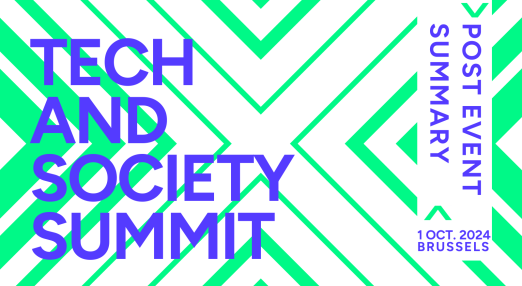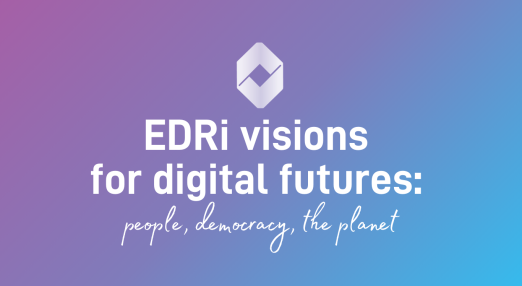Information democracy
Powerful companies and governments control the way the internet and new technologies are deployed. These actors blur the lines on corporate power in ways that have tremendous impact on people and democracies. The dominant business model of ‘Big tech’ platforms is based on surveillance, polarization and power imbalances. This ‘surveillance capitalism’ has had a global impact on democracy. For example, state and private actors can use the internet and technologies to spread political disinformation, to manipulate electoral results, to attack human rights defenders and to limit civic space.
Filter resources
-

EDRi-gram, 24 October 2024
With winter almost on our doorstep, we're warming up for a busy few months in the EU digital rights space. In early November, we'll be paying close attention to the European Parliament hearings of the Commissioner-designates selected by Ursula Von Der Leyen. Earlier this month, the European Commission unveiled its highly anticipated Digital Fairness Fitness Check report. The report is likely to have a major influence on the Commission’s planned Digital Fairness Act proposal, which will affect our digital rights. Let’s unpack this together. Protection of young people online should be achieved through empowerment not exclusion. This is the highlight of our and our members' submission to the European Commission’s call for evidence for the Digital Services ActArticle 28 guidelines for the protection of minors online. This month, we also co-hosted – along with 41 other civil society organisations – the Tech and Society Summit. A first-of-its-kind space when we're inundated with industry-sponsored events, the summit created a bridge between civil society and new policymakers, to achieve accountable, people-focused policies that advance everyone’s digital rights.
Read more
-

Tech and Society Summit: Decision-makers and civil society articulate a digital agenda that centers people, planet and democracy
On 1 October 2024, 41 civil society organisations – including EDRi – co-hosted the Tech and Society Summit. Throughout the day, EU decision-makers, journalists and civil society held discussions, joined panels and participated in activities that fostered dialogue about the intersections of technology, society and the environment.
Read more
-

EDRi-gram, 9 October 2024
Last week, we gathered with hundreds of EU decision-makers, Members of European Parliament, civil society representatives and journalists at the Tech and Society Summit in Brussels. As one of the 41 co-organisers of the Summit, we were inspired by the visionary ideas in the various panels, discussions and chat – all towards centering people, the planet and democracy in the EU tech agenda. Stay tuned for more highlights and recordings from the day. One of the main takeaway from the Summit was that systems of control and surveillance – which are becoming increasingly central to EU policies – will not make us safer. Nowhere is this more apparent than at Europe’s own borders where technology is being used to dehumanised migrants. Read the blog by Access Now’s Caterina Rodelli who travelled across Greece to see first-hand how this is happening. On a positive note, the infamous “Chat Control” proposal is dead and buried again – for now. And we have the Dutch to thank for this positive development! We have more details for you.
Read more
-

Prioritising safety, participation, and community care: A vision for our digital future
Together, we can protect human rights, strengthen democracy, and reshape societal systems. Read about our commitment to prioritising safety, participation, and community care, as part of our Vision for 2024 and beyond.
Read more
-

EDRi-gram, 25 September 2024
With summer on its way out, there might be a chill in the air. But there’s none to be found in Brussels and the digital rights world. Last week, we were glued to our screens as the European Commission President Elect, Ursula Von Der Leyen, announced the Commissoners-Designate and what they’ll be in charge of. Now, these Commissioners will go through live-streamed hearings at the European Parliament next month before starting work. We’ll be watching with interest… and maybe popcorn. This week, we’re also concerned about the impact of age verification proposals on fundamental rights and the well-being of children and young people. Spoiler alert: it’s not good. Evidence & lived experiences show these tools are dangerous, discriminatory and unsafe. EDRi and 63 organisations and experts wrote to the European Commission to urge them to halt proposals for using such tools in the implementation of the Digital Services Act (DSA) and the eIDAS Regulation. Now that we’ve all firmly, albeit sadly, turned off our summer out-of-office messages, it’s also time to catch up on what Google, Meta, X and other tech giants have been up to over the summer, especially with the DSA and Digital Markets Act (DMA) in place.
Read more
-

Making decision-making just and accountable: A vision for our digital future
Together, we can protect human rights, strengthen democracy, and reshape societal systems. Read about our commitment to making decision-making just and accountable, as part of our Vision for 2024 and beyond.
Read more
-

EDRi-gram, 11 September 2024
With the post-election shake-up and the upcoming appointment of new European Commissioners, both governments and tech giants are making moves that could threaten our rights. In Denmark, efforts to broaden the definition of antisemitism, including criticism of the Israeli state, may lead to the misuse of the Terrorist Content Online Regulation to silence pro-Palestinian voices. In France, legal action against Telegram’s co-founder has intensified calls for stricter enforcement of the Digital Services Act. At the EU level, we’ve seen a troubling decision by the European Commission to cut funding for free software projects. In light of these challenges, and as we prepare for the next EU mandate, we’ve launched a collective strategy process with our members and partners to ensure civil society’s voice is heard in shaping the future of EU digital legislation. On 1 October, over 40 organisations will meet at the Tech and Society Summit to bring our collective vision on the intersection of technology, society, and the environment closer to decision-makers.
Read more
-

Prioritising planet care: A vision for our digital future
Together, we can protect human rights, strengthen democracy, and reshape societal systems. Read about our commitment to empowering people to flourish and thrive, as part of our Vision for 2024 and beyond.
Read more
-

EDRi-gram, 10 July 2024
This is the last edition of EDRi-gram before we take a (well-deserved) break for the summer. Keeping you updated about the various goings-on in the busy world of digital rights is a toilsome task! Don’t worry, this edition is full of interesting news and recommendations for you to follow up on all summer long. You can start by going through a new document pool by the Resist Europol coalition that brings together all relevant resources you’ll need to understand and contest EU’s securitisation agenda, especially through the seemingly never-ending expansion of the bloc’s agency for law enforcement cooperation. With Hungary taking over the presidency of the Council of the European Union as of last week, EDRi and 47 digital rights, human rights & children’s rights organisations have called for the withdrawal of the draft CSA Regulation proposal. It is high time to say good riddance to a proposal that is not only unfit for addressing the complex issue of child sexual abuse, but would also undermine private and safe online communication for all.
Read more
-

Empowering people to flourish and thrive: A vision for our digital future
Together, we can protect human rights, strengthen democracy, and reshape societal systems. Read about our commitment to empowering people to flourish and thrive, as part of our Vision for 2024 and beyond.
Read more
-

EDRi-gram, 26 June 2024
Summer seems to have finally arrived in Brussels, just in time for the heart of the EU to reel from the results of the European elections. Maybe having the sun will make it all bearable? Stay tuned as we test out this theory. We do have some positive news to share from the world of digital rights. Earlier this month, LinkedIn gave in to pressure from civil society and Digital Services Act (DSA) enforcers based on a complaint by EDRi and three partner organisations. The platform will no longer allow advertisers to target ads based on sensitive personal data from users. A big win for privacy! On a similar sunny note, EDRi and the Reclaim Your Face campaign were recently recognised as the Europe AI Policy Leader in Civil Society for our groundbreaking work advocating for a world free from biometric mass surveillance. Do you want to read more about the EDRi network’s impact on defending and advancing digital rights? Our 2023 Annual Report is out now for you to peruse!
Read more
-

EDRi Annual Report 2023: Our collective impact defending digital rights in Europe
In our Annual Report, you can read more about EDRi’s efforts to build an inclusive and equitable digital environment that allows us all to thrive. In 2023, we resisted attempts to normalise corporate and state surveillance, mobilised thousands of supporters, and had an unmistakable impact on European tech policy.
Read more
